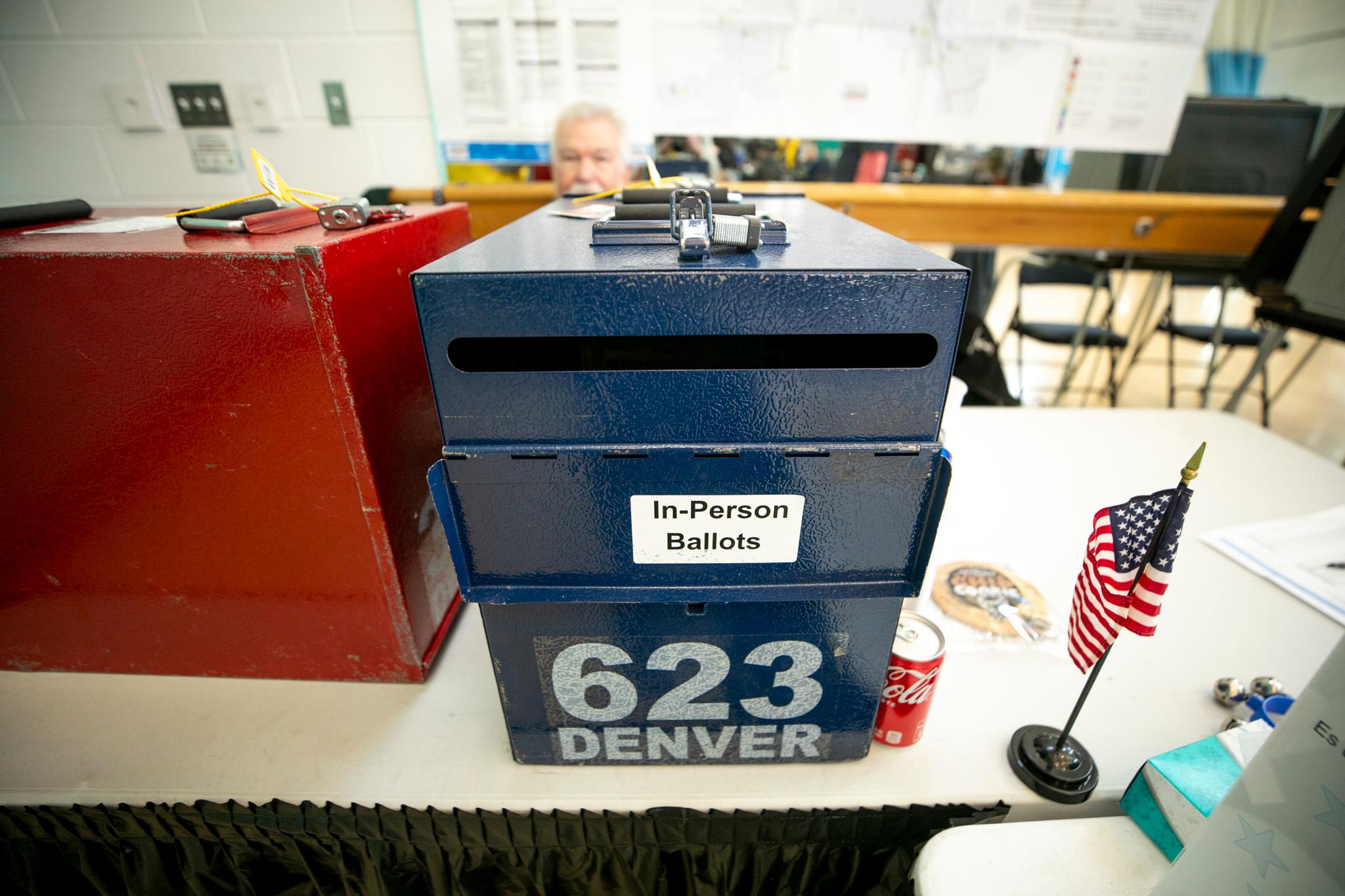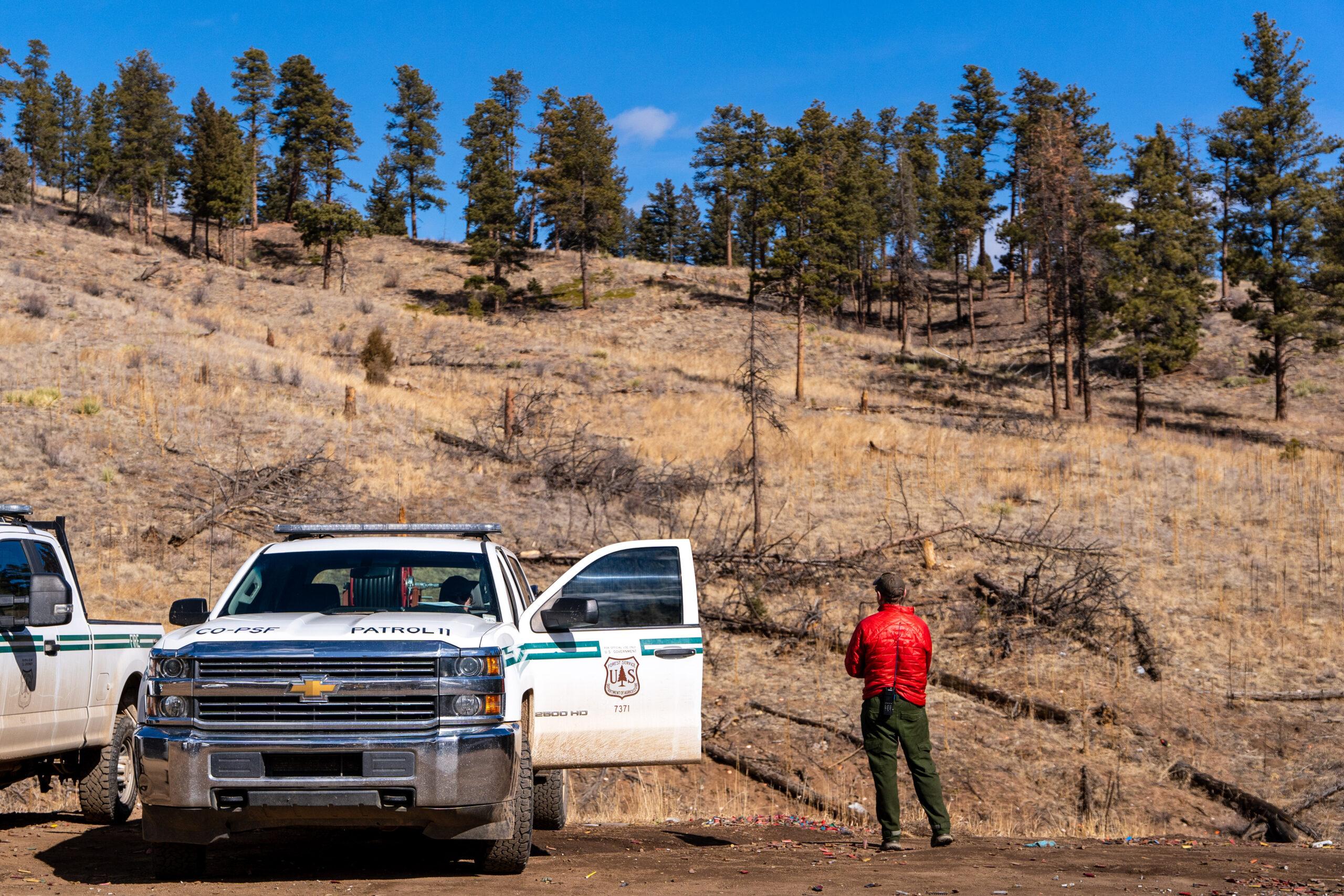
Advance Colorado, an influential conservative action committee, had a particularly successful night at the ballot box on Tuesday.
The statewide ballot included three different law enforcement-related measures that passed with strong majorities. However, another of the group's proposals, one that would have enshrined school choice in the state constitution, failed.
Proposition 128, which won approval from 62 percent of voters, was among Advance Colorado’s successes. Once it goes into effect next year, anyone convicted in Colorado of crimes including murder, sexual assault and serious cases of assault, kidnapping, arson and burglary must now serve at least 85 percent of their sentence before becoming eligible for parole or early release for good behavior.
That’s an increase from current law, which allows inmates to apply for discretionary parole once they’ve served at least three-quarters of their sentence, or even sooner if they’ve earned time off through good behavior while incarcerated.
Kristi Burton Brown, Executive Vice President of Advance Colorado, said the passage of Prop. 128 shows Coloradans are concerned about violent crime in their communities.
“I think voters have heard the governor and the legislature say they want to make us safer, but they're not passing laws that do it,” she said. “So I think when you see 128 and the big margin of victory there, you see that when a legislature continues to reject laws that people want, you see citizens step up and implement that law themselves because we're very concerned about crime and public safety in our communities.”
Opponents of Prop. 128 included Colorado Criminal Justice Reform, Working Families Party Colorado, Coloradans for Smart Justice and the ACLU Colorado. They argued the change would raise prison costs while reducing the incentive for inmates to participate in things like education, work programs and mental health treatment.
Kyle Giddings, Civic Engagement Coordinator for Colorado Criminal Justice Reform told CPR News that with the passing of Prop. 128, the state has returned to the era of mass incarceration.
“We see in other states like Arizona, where they have a similar law, that violence has increased in jails, as have recidivism rates,” he said. “[Prop. 128] puts a whole group of people into a world where there’s no incentive to do the work and be rehabilitated.”
Burton Brown, however, pointed to a 2021 case involving Kenneth Dean Lee, a known sexual offender who was out on parole after serving just eight years on a 20-year sentence when he posed as an immigration official and sexually assaulted a seven-year-old girl in her Aurora apartment. Lee was later convicted of the crime after officers were able to confirm his presence at the apartment via his GPS ankle monitor. He’s serving a 40-year sentence. The case was part of Advance Colorado’s campaign for Prop. 128.
“If 128 had been law at the time, [Lee] would not have gotten out after eight years and that girl would not have been victimized by a violent offender who should have stayed in jail,” Brown said.

The second Advance Colorado measure passed Tuesday was Proposition 130. It will require the state government to set aside $350 million in a dedicated fund for law enforcement. The money would go toward grants to help local departments with hiring, training and retaining officers. Numerous local departments have struggled to attract and retain officers for years, with some smaller departments closing altogether. It will also fund a new $1 million death benefit for the families of law enforcement killed on the job.
“[Proposition] 130 was a little unique in that it didn't specifically restrict or put higher penalties on a particular crime,” Burton Brown said. “Instead [it] said, if we want to fight crime, we need to make sure our officers both can be retained with higher bonuses or higher salaries but also can be trained. And I think this is why it appealed to people on both sides of the political aisle.”
As an example of the sorts of training the fund can help support, Advance Colorado has pointed to the management of domestic violence cases. The state is actively working to increase the number of agencies using the Colorado Lethality Assessment Program which is a list of questions that officers can use to determine how much danger a domestic abuse survivor is in at home.
Just 36 of the state’s 240 law enforcement agencies were using the tool as of August, even though a recent report by Colorado’s Attorney General’s office said the system is proven to lower domestic violence deaths.
Burton Brown says training is also needed for use of force practices, interacting with people dealing with a mental health crisis and human trafficking.
“You often see Republicans and conservatives who want more police officers, and then you see Democrats and more liberals who want to see them be better trained, and 130 provided a path for both of those things to happen,” she said.
Opponents like Giddings argue that Proposition 130 is fiscally irresponsible because it forces lawmakers to prioritize law enforcement no matter what other needs might exist in the budget.
He told CPR News its passage results in a missed opportunity to reevaluate where the state’s criminal justice dollars are going.
“Colorado chose only to invest in police with this measure. The $350 million doesn’t go to fire [departments] or EMTs, who are necessary partners for officers when it comes to mental health crises in the field,” Giddings said.

Advance Colorado is also celebrating the passage of Amendment I, which 69 percent of voters backed. Once in effect, it will make first-degree murder suspects ineligible for bail, so long as prosecutors prove to a judge that they have enough evidence to move forward in the case.
State lawmakers overwhelmingly voted to put the amendment on the ballot to deal with an unintended consequence of their decision to repeal Colorado’s death penalty four years ago.
Existing language in the state constitution dictates that only people charged with “capital offenses” can be denied bail. The state supreme court concluded last year that, without capital punishment as an option, first-degree murder no longer meets the criteria for denying bail.
The amendment had no organized opposition. However, some justice reformers like Giddings argue that it violates the principle of “innocent until proven guilty.”
“[Amendment I] is a complete failure of victims of crime. When you look at cases with survivors of domestic abuse who may have to fight or unfortunately kill someone to escape, those people should not be locked up in jails for the entirety of their pre-trial detention. They should be getting the support and services they need,” Giddings said.
Under current law, judges have the discretion to set bail in first-degree murder cases and have used incredibly high, cash-only bonds to keep first-degree murder suspects in jail ahead of their trials.

The only measure on the ballot backed by Advance Colorado that failed on Election Day was Amendment 80 with 52 percent of Coloradans voting against it. The effort aimed to enshrine school choice in the state constitution. Advance Colorado argued it would protect families' right to choose the school — public, private, homeschooled or other options — that they deem is the best fit for their child.
“I think right now, Coloradans are very happy with their school choice rights and may not feel like they're under threat,” said Burton Brown. She tells CPR News a threat might look like the charter school accountability bill that failed to pass the legislature last year. It would have significantly changed how Colorado charter schools operate, making it simpler for local districts to close them.
The measure was opposed by a coalition that included the Colorado Education Association, the Colorado PTA, the Christian Home Educators of Colorado, Colorado Democrats, Stand for Children, the ACLU Colorado and others. The National Teachers Union financially supported the campaign against Amendment 80.
“Fifteen percent of our kids go to charter schools, but there are absolutely politicians who are elected in Denver that work at the Capitol that want to shut those schools down,” Burton Brown said. If legislation like that were to reappear, Advance Colorado believes an amendment like 80 would pass in a future statewide election.
With the 2024 election behind it, Advance Colorado wants to capitalize on the apparent momentum behind “tough on crime” policies in the state. The group said it will work with district attorneys and law enforcement agencies this year and next to learn what kinds of problems they’re facing and what other laws might help them.
“I know fentanyl is a huge issue being talked about that the legislature has largely failed to act on, and people are still very concerned about that. So that's certainly one we'll look into and we have a whole list,” said Burton Brown.
In recent years, state lawmakers have raised the penalty for possessing small amounts of fentanyl and made it a specific crime to sell drugs that result in someone's death. However, some would like to see policymakers go further.
Giddings said going forward, it’s important for Coloradans to understand who ballot initiatives are being sponsored by before voting.
“Conservatives are choosing to legislate from the ballot rather than working to create a party that people want to elect,” he said. “CCRG is committed to working with the community and lawmakers to find genuine solutions to problems, not just doubling down on fear-mongering.”








